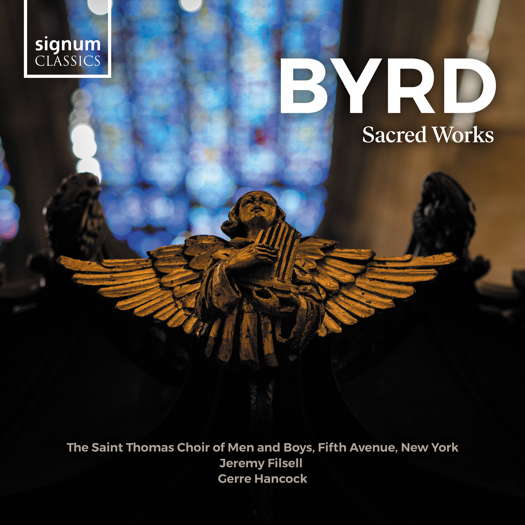- Markus Stenz
- Decca Music Group Ltd
- Opera Leipzig
- Santa Ratniece
- Undercroft Opera Company
- Nikolai Kaufmann
- Ann Schein
- Radio Flowers Orchestra
 WORD SEARCH: Can you solve Allan Rae's classical music word search puzzles? We're currently publishing one per month.
WORD SEARCH: Can you solve Allan Rae's classical music word search puzzles? We're currently publishing one per month.
 DISCUSSION: John Dante Prevedini leads a discussion about Composers, individuals or collective?, including contributions from David Arditti, Halida Dinova, Robert McCarney and Jane Stanley.
DISCUSSION: John Dante Prevedini leads a discussion about Composers, individuals or collective?, including contributions from David Arditti, Halida Dinova, Robert McCarney and Jane Stanley.

Inexhaustible Genius
GERALD FENECH welcomes a new disc of sacred choral music by William Byrd
'... the singing is consistently exquisite, marvellously balanced and warmly intimate.'
It is the genius of William Byrd (circa 1540-1623) which first attracts musicians and listeners to his music: his fine command of invention and dramatic flow, his subtle melodies and harmonic turns mixed with a sophisticated understanding of the texts that he chose to set. Quite simply he was the finest composer of his age. As if this were not enough, the added dimension of his life as a recusant Catholic in reformed England gives his music, indeed his whole life, an extra degree of fascination. The story of how a man could not only cling to his beliefs but also publish them abroad in musical form, when all around him were being attacked for their faith, is indeed remarkable.
Until recently, there was disagreement regarding his date of birth, but this has finally been resolved, and Byrd's year of birth has now been fixed at late 1539 or early 1540. He must have been active in or around Westminster during the reign of Queen Mary in the mid 1550s and before the death of John Sheppard, as Sheppard and Byrd, together with the young William Mundy, each contributed music for a setting of In exitu Israel. This Psalm, with its specific liturgical function in the Sarum rite, was almost certainly written for Mary's restored Catholic rite.
His first official post appears to be as organist of Lincoln Cathedral in 1562. He remained there until the untimely death of the composer Robert Parsons in 1572, an event that worked in Byrd's favour, as he was appointed to the Chapel Royal in Parsons' place, thus allowing him to return to London. His first appearance in print was in 1575 with a joint publication (with his friend and mentor Thomas Tallis) entitled Cantiones Sacrae. He was exceptionally active in the late 1580s, publishing two secular collections (in 1588 and 1589) and two sacred collections (in 1589 and 1591) within the space of four years.
In the early 1590s Byrd took leave of London for a less public life in Stondon Massey in Essex. Here he became part of the extended Catholic family of Sir William Petre and took part in the recusant ceremonies centred on Ingatestone Hall. He produced music specifically for Catholic liturgies and even dared to publish them. The three settings of the Mass appeared anonymously during the 1590s, and two volumes entitled 'Gradualia' were published in 1605 and 1607.
Listen — Byrd: Gloria in excelsis (Mass for Four Voices)
(SIGCD776 CD1 track 4, 0:00-1:00) ℗ 2023 Signum Classics :
Byrd was censored for his faith and called to account but never received stern punishment or any form of depravation. Perhaps the censors did not believe that music could be dangerous, or could it be that Byrd was so excellent a composer that he was simply beyond reproach? Byrd died in his early eighties - maybe eighty-three? - on 4 July 1623, leaving for posterity some six hundred works, the majority of which are sacred choral pieces of the utmost beauty.
Listen — Byrd: Credo (Great Service)
(SIGCD776 CD2 track 12, 1:51-2:50) ℗ 1981 Signum Classics :
This fine CD includes fifteen such pieces full of eloquent and moving music, and the singing is consistently exquisite, marvellously balanced and warmly intimate. That Byrd's music has a substantial number of recordings to its name is common knowledge; nonetheless, this issue is a most welcome addition to the composer's discography, if only for the reason that it showcases once more Byrd's inexhaustible genius to write in an almost perfect polyphonic way.
Listen — Byrd: Ave Verum Corpus
(SIGCD776 CD2 track 1, 3:44-4:43) ℗ 2023 Signum Classics :
Certainly one for choral buffs, but those less enthusiastic can still find much to enjoy. Sound and presentation compliment the excellence of the music-making.
Copyright © 5 February 2024
Gerald Fenech,
Gzira, Malta



